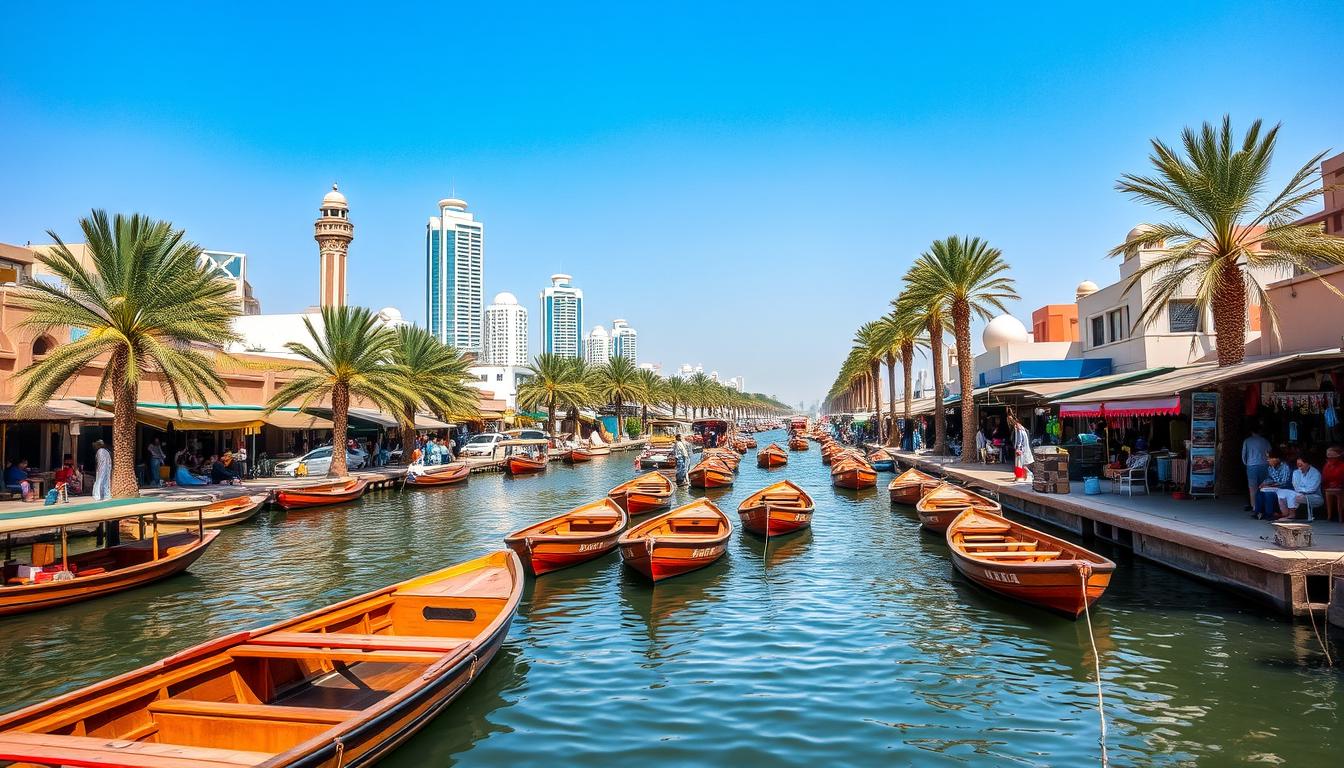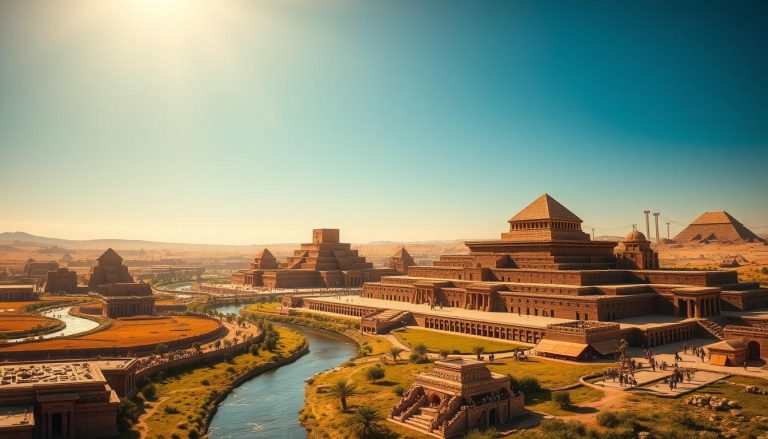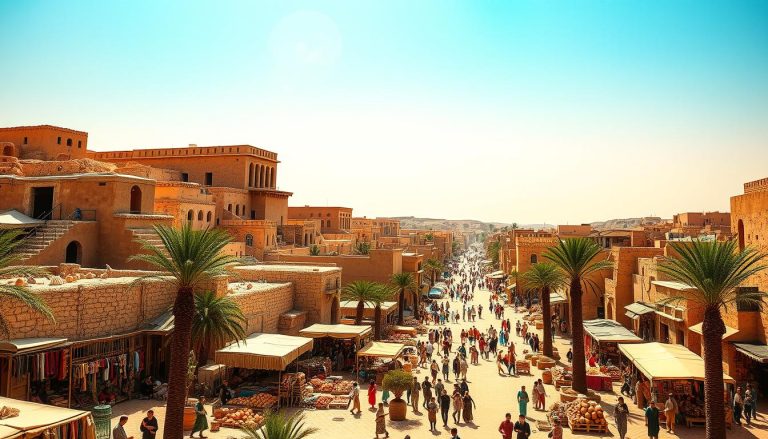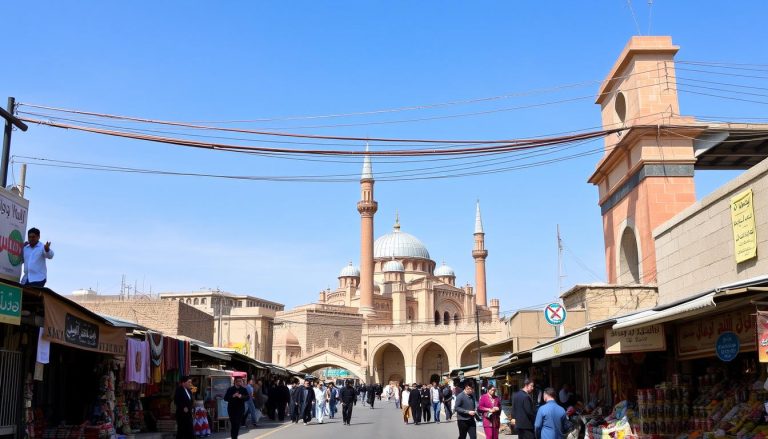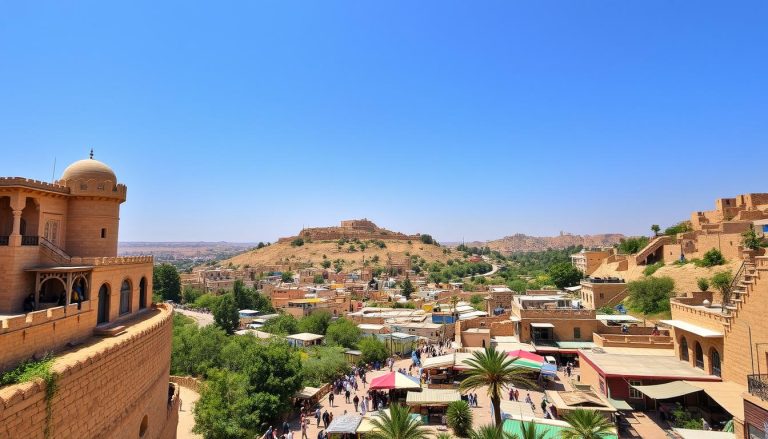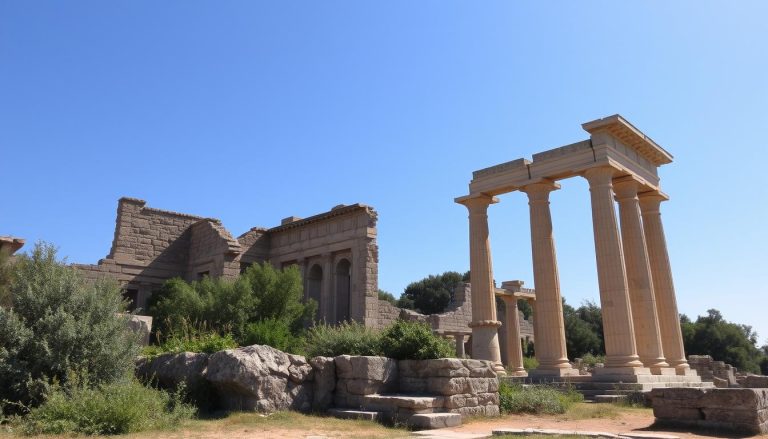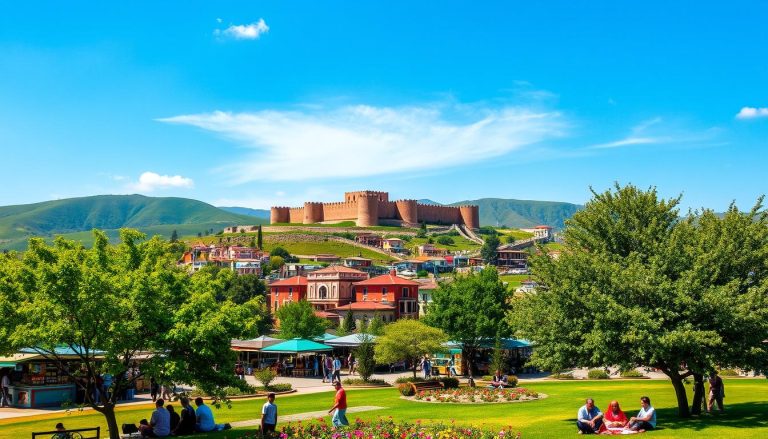Basra, Iraq, is a city by the Shatt al-Arab River. It’s full of cultural experiences and natural wonders. You might wonder what hidden gems are waiting to be found.
From the historic Basra Museum to the lively Old Basra Market, there’s a lot to see. The city shows off its rich heritage and modern charm.
Key Takeaways
- Immerse yourself in the cultural heritage of Basra at the renowned Basra Museum
- Discover the vibrant Old Basra Market, a hub for traditional Iraqi crafts and local delicacies
- Embark on an adventure through the serene Ashar Creek for a unique perspective of the city
- Explore the awe-inspiring Iraqi Marshes, a UNESCO World Heritage site also known as the “Venice of the East”
- Stroll along the Corniche al-Basra waterfront and enjoy the city’s picturesque gardens and entertainment
Exploring the Historic Shatt al-Arab River
In the heart of Basra, the Shatt al-Arab River is a beautiful waterway. It’s where the Tigris and Euphrates rivers meet. Take a river cruise to see the stunning riverbanks and the lively port life.
Best River Tour Experiences
As you cruise on the Shatt al-Arab, you’ll see traditional fishing boats and big cargo ships. You might even see Iraq’s naval history. Tour guides will share the river’s history and its impact on Basra.
Sunset Cruise Options
For a magical time, try a sunset cruise on the Shatt al-Arab. Watch as the sun sets over the river and city, making it a moment you’ll always remember.
Traditional Fishing Village Visits
Visit the traditional fishing villages along the Shatt al-Arab. Here, you can see old fishing ways and learn about local culture. Talk to the people and understand the Basra waterways that support them.
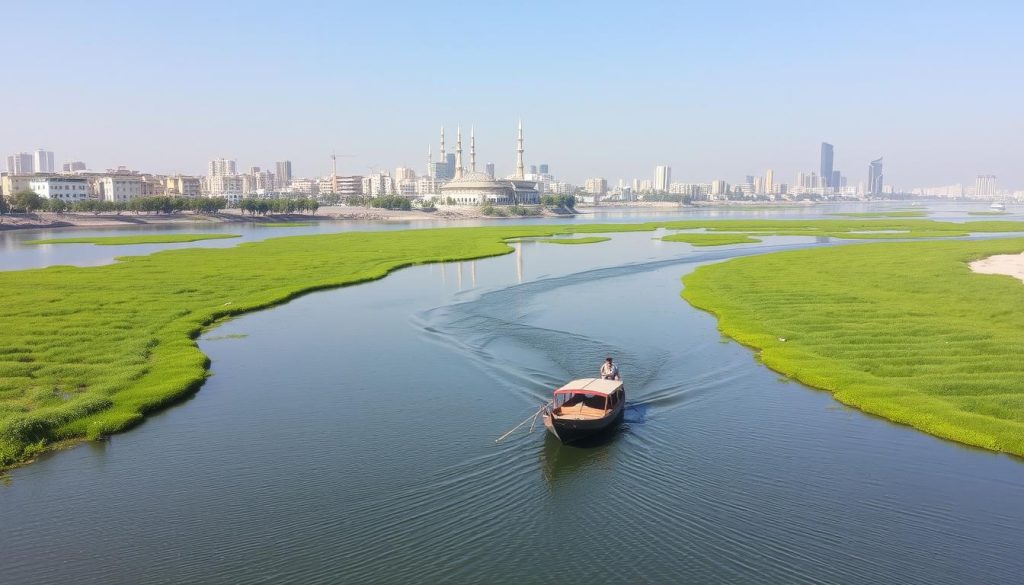
“Exploring the Shatt al-Arab River is a must-do for any visitor to Basra. The river’s rich history and the opportunity to witness traditional fishing and port life make it a truly captivating experience.” – Sarah, travel blogger
Discovering the Basra Museum's Cultural Heritage
The Basra Museum is by the Shatt al-Arab River. It shows Iraq’s history with Sumerian artifacts and Islamic art. It’s in a palace once owned by Saddam Hussein. This place takes you back in time.
Its exhibits cover thousands of years, from Sumerians to Islamic times. You can see old pottery, coins, and fabrics. These items show life and culture long ago. Guided tours and special shows add more to your visit.
“The Basra Museum is a true treasure trove, a window into the remarkable cultural legacy that has shaped this region for generations.”
If you love history or want to learn about the Middle East, the Basra Museum is for you. It offers a deep look into Iraqi history and its global impact. It’s a place of learning and discovery.
Navigating the Old Basra Market
The Basra bazaar sits by the Shatt al-Arab waterway. It’s a lively spot that shows off the city’s rich culture. Here, you can find traditional Iraqi souvenirs and local crafts. It’s a place where you can dive into the daily life of Basrawi.
Traditional Iraqi Crafts Shopping
Stroll through the crowded stalls and see the traditional crafts on display. You’ll find everything from beautiful textiles and rugs to wooden sculptures and brass ornaments. Local guides can tell you the stories behind these crafts.
Local Delicacies and Spices
The smell of local cuisine fills the air. You can try cardamom tea, grilled masgouf, and date desserts. It’s a feast for your senses, showing off Basra’s food heritage.
Best Time to Visit the Market
The Basra bazaar is most lively from November to March. During these months, the market buzzes with people and energy. It’s the perfect time to find souvenirs, taste local foods, or just soak in the culture of Basra.
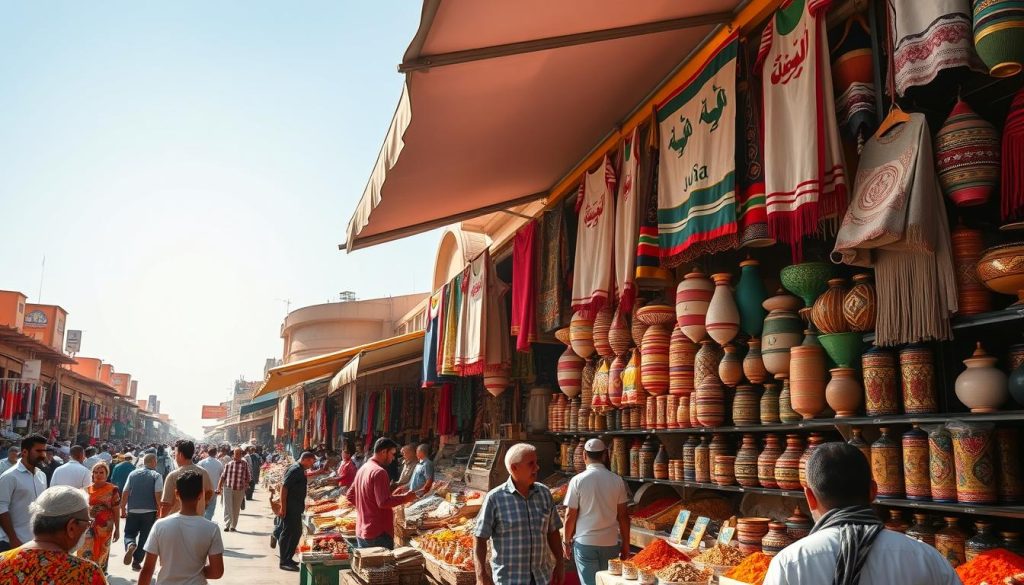
Adventures in Ashar Creek
In the heart of Basra, Iraq, the Ashar Creek is a mix of city life and calm waters. It’s a perfect spot for kayaking, blending Basra’s old charm with its modern side.
As you kayak, you’ll see amazing buildings and old marsh houses (Mudhif) together. Guides tell stories of traders and merchants who used these waters. It’s a peek into Basra’s rich sea history.
Birdwatchers will love seeing many bird species in the creek’s green space. It’s a calm break from the city, showing nature’s beauty right next to Basra’s busy life.
For those who love kayaking or exploring cities, the Ashar Creek is a must-see. You can choose your own adventure, from easy paddles to bold explorations. It’s a special place in Iraq for adventure lovers.
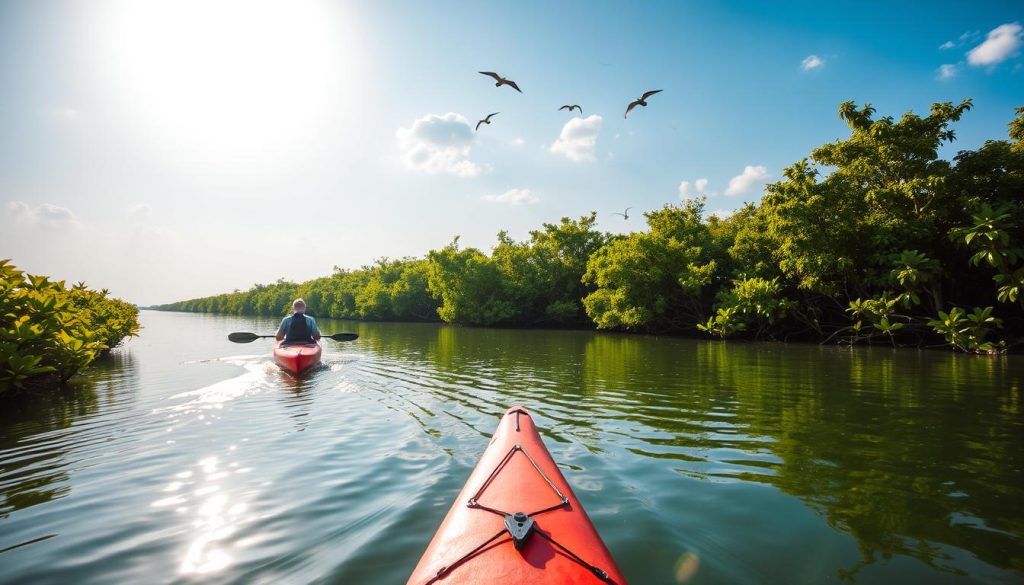
| Ashar Creek Kayaking Experiences | Duration | Highlights |
|---|---|---|
| Leisurely Paddle | 1-2 hours |
|
| Guided Creek Adventure | 3-4 hours |
|
| Extended Exploration | Half-day or Full-day |
|
Iraqi Marshes: Venice of the East
Explore the Mesopotamian Marshes, a UNESCO World Heritage site known as the “Venice of the East.” These wetlands are a home to the Ma’dan, a community that has kept its traditions alive for centuries. Take a traditional ‘mashoof’ (canoe) tour to see the waterways, reed beds, and floating islands.
Traditional Mashoof Boat Tours
Travel on a traditional mashoof, a wooden canoe made by the Ma’dan. Local boatmen will show you the marshes’ beauty and tell you about the area’s ecology and the Ma’dan’s lifestyle.
Wildlife Spotting Opportunities
The Iraqi Marshes are great for birdwatching, with many migratory species. Look out for herons, flamingos, and the Basra Reed Warbler. Guides will help you spot the area’s plants and animals.
Meeting the Marsh Arabs
Get to know the Ma’dan, the Marsh Arabs, and their traditions. Visit their floating villages and see their reed homes. This experience supports the local community and preserves the Marshes’ heritage.
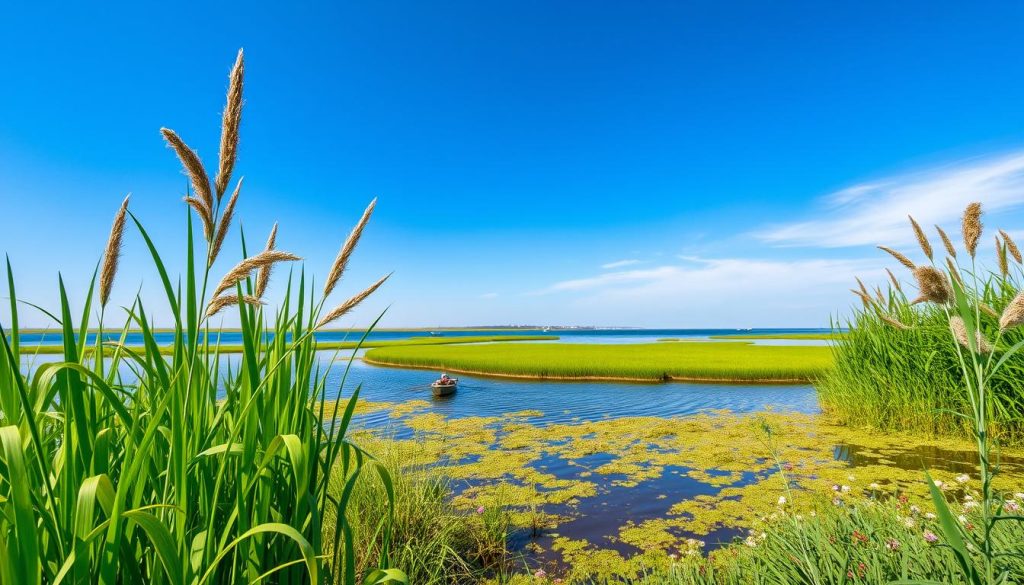
“The Iraqi Marshes are a true natural wonder, a place where the past and present coexist in a delicate balance. Exploring this ‘Venice of the East’ is a transformative experience that will leave you in awe of the resilience and ingenuity of the Ma’dan people.”
Exploring the Corniche al-Basra Waterfront
The Corniche al-Basra is a peaceful spot in Basra. It runs along the Shatt al-Arab river. Here, visitors can enjoy the city’s culture and nature.
Dining and Entertainment Options
The Corniche has many places to eat, from casual spots to fancy restaurants. You can try Iraqi cuisine like masgouf, dolma, and baklava. Enjoying these dishes with views of the water is amazing.
At night, the Corniche comes alive. You’ll find live music, street shows, and people having fun. It’s a great place for urban recreation.
Photography Spots
The Corniche is perfect for photographers. It has beautiful waterfront attractions and views. You can take pictures of the Basra promenade, bridges, and cultural scenes.
There are also gardens and art installations. These make great subjects for photos.
Evening Activities
At night, the Corniche is bustling. People walk along the river, enjoy the breeze, and relax. Some go on boat rides or fish.
It’s a great place to experience Basra’s urban recreation and culture.
| Activity | Duration |
|---|---|
| Stroll along the Corniche | 30 minutes to several hours |
| Boat rides on the Shatt al-Arab river | 30 minutes to 1 hour |
| Fishing on the Corniche | 2 hours to a full day |
| Dining experiences | Minutes for quick bites, 2 hours for full dining |
| Sunset watching | 30 minutes before and after sunset |
| Picnics at Corniche Park | 1 hour to an entire afternoon |
| Historical monument tours | 30 minutes to a few hours |
| Outdoor fitness classes | 1 hour, early morning or late afternoon |
| Bicycle rides | 30 minutes to several hours |
Maritime Heritage and Dhow Building
Basra’s rich maritime history is shown through its thriving dhow building industry. Dhows, the iconic wooden sailing vessels of the Persian Gulf, have been crafted here for centuries. They reflect the enduring traditions of Iraqi craftsmanship. Visitors to Basra can immerse themselves in this captivating world by touring the dhow building yards.
At the dhow building workshops, you can witness the intricate process of dhow construction. From selecting the finest wood types to assembling the boat’s components, it’s a hands-on experience. Under the guidance of master craftsmen, you’ll learn about the cultural significance of dhows in the region’s maritime trade and communication across the Middle East.
- Observe the traditional boat crafting techniques used by Iraqi dhow builders
- Learn about the historical importance of dhows in maritime trade and communication across the Middle East
- Gain a deeper understanding of the cultural significance of dhows in the region’s maritime heritage
Immersing yourself in Basra’s dhow building workshops is a captivating way to connect with the traditional boat crafting and Persian Gulf maritime history. This experience provides a rare glimpse into the enduring legacy of these iconic vessels. It allows you to appreciate the enduring artistry and significance of this timeless craft.
Palm Tree Forests and Date Gardens
Outside Basra’s busy streets, a peaceful oasis awaits. Palm tree forests and date gardens offer a calm escape. Here, you can experience rural Iraqi life up close.
Traditional Date Farming
Basra’s outskirts are famous for their date palms. Visit the plantations to see how these fruits are grown and picked. You’ll find many types of dates, each with its own taste and feel.
Picnic Locations
Have a quiet picnic under the date palms. The sound of leaves and the view make it perfect. It’s a great chance to try local food and enjoy the countryside.
Local Agriculture Tours
Go on a tour of Basra’s date gardens and palm forests. You’ll learn about their importance in Iraqi culture and economy. You’ll also see how farming has been done for generations.
